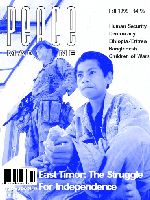
Peace Magazine Fall 1999, page 29. Some rights reserved.
Search for other articles by Geoffrey Pearson here
Lawrence Wittner Stanford University Press, 1997.
This is the second volume of a three volume history of the peace movement. The author ends this detailed and meticulous account of the world-wide "ban the bomb" movement in the '50s and '60s with a verdict of "ambiguous victory." Ambiguous it certainly was, for, despite the partial test ban and other arms control agreements of the 1960s, nuclear weapons continued to accumulate long after 1970. But was it a victory for the movement or for the statesmen of the time, including Kennedy and Khrushchev (not to mention Howard Green of Canada), influenced, as they were, by the anxieties of their people? The author concludes, sensibly, that without the movement, such anxieties would have been less acute.
But they were not acute enough to move the great powers towards real measures of disarmament. Such measures, Wittner notes, were ruled out by the "fierce hostilities of the international order." It would take twenty more years for these hostilities to abate, and for any reductions in nuclear weapons inventories to actually start.
The author has done a prodigious amount of research, including the memoirs and papers of NGOs, scientists and officials in the USA, U.K., Canada, Australia, New Zealand, Japan, the former USSR, and the non-aligned countries. There are 105 pages of notes and a 28-page bibliography. For Canada alone, he consulted the records of the CND, Peace Congress, Voice of Women, and the World Federalists, as well as the official papers and memoirs of Pearson, Diefenbaker, and Walter Gordon.
Lawrence Wittner will bring this survey of popular resistance to nuclear proliferation up to date. For, despite the reductions in strategic arms already agreed upon, the outlook for the outright abolition of nuclear weapons is not bright. The USA and Russia remain locked in a dangerous stalemate over the pace and means of nuclear disarmament. The book informs us who confront what Dean Rusk called "the great mystery," why a universal yearning for peace finds so little response in the actions of governments, to look back in anger and in hope.
Reviewed by Geoffrey A.H. Pearson